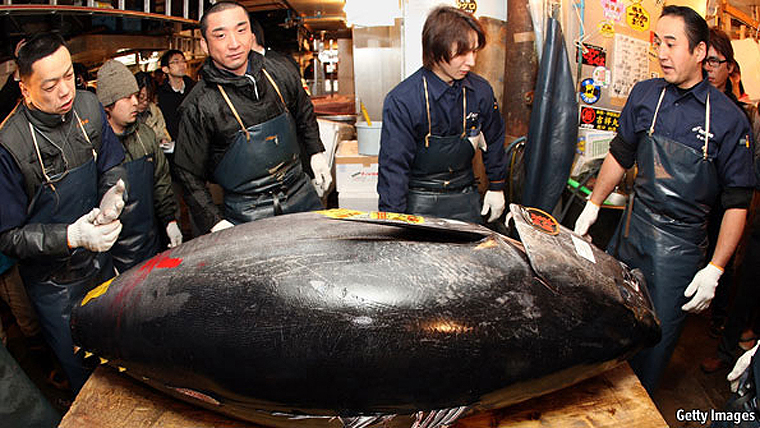
The quintessential world treaty, CITES, which has done so much good since its inception in the 1980s to protect endangered species became totally politicized at the March meeting in Doha.
Horse trading ruled the day. Sorry, elephant trading.
The convention resoundingly defeated any attempt to relax elephants’ listings as endangered. There will not even be any one-off sales of stockpiled ivory, as requested by Tanzania and Zambia and supported by most of the southern African countries.
Elephants won, but at the expense of bluefin tuna; many corals; hammerhead, oceanic whitetip and spiny dogfish sharks; and polar bears. The scientific reports tabled at the convention overwhelmingly supported at least some restrictions on these rapidly dwindling species.
But while in the past science ruled mitigated by a harsh but important consideration for local economies, this convention was ruled by politics.
And it was crass.
After eles won, the big fight was over bluefin tuna. There is wide consensus that the population is in catastrophic decline but also wide recognition of its economic importance, not just in Japan, but also in Europe. There is even an organization created by world powers just to regulate this single species: the International Commission for the Conservation of Atlantic Tunas (ICCAT).
It’s a very practical commission: the mandate – unlike CITES – is not to protect the biodiversity of planet earth, but its economies. Economists recognized that without regulation the bluefin will disappear, so that regulation that prolongs the species’ existence is a good economic move.
But ICCAT was politicized last year when the European Union made an end-run on the commission’s authority by claiming that Europe as a whole – rather than just the European countries’ that consume bluefin – must be regulated.
By the formulaic process that economists – as opposed to environmentalists – work, that allowed France, Portugal, Spain and Britain to harvest a disproportionate amount of bluefin compared to the population of Japan, since their consumption was numerically diminished by nonconsuming eastern European nations.
So it left Japan out in the cold … sorry, out in the sea.
Japan responded at CITES by flying in the trade and fishery ministers of more than two dozen African countries where Japan is the champion of free-world non-military foreign aid. These senior government officials trumped the scientists which used to be the sole delegates and voters at the convention.
Then, to celebrate before victory, Japan hosted a huge reception where it served blue-fin tuna. Martha Stewart would call that Bad Form.
And the polar bear trading didn’t stop there. Why did Senegal, who supported the ban on elephants, vote against listing polar bears? Supposedly because there was an Inuit delegation that successfully argued it was their livelihood (even though CITES could clearly not regulate indigenous hunting of species). I think rather it was tit for tat. Sorry, eles for bears.
What does it all mean, that the natural history of earth is now being won or lost by the best politicians?
What does it mean that national health is being won or lost by the best politicians?
The complex answer is the same. It means that science and practical sense loses to forces more immediate: and that usually means the pocket-books of the rich and powerful. Sorry, rich is powerful. (And vv.)
I wrote earlier about the slow response America had to all of this. Well, to some extent, America came through at the last moment. The Kenyans take credit for probably instructing the Americans on what was happening, and in all the battles, the Americans came out on the side of a green earth.
But it took them a while, and they had no good response to the blue-fin tuna dinner. There’s so much on the table at the moment for America’s new administration, that I guess they just didn’t see the fish.
Hi Jim,
Thank you very much for your continuous sending of the “Jim’s Blog”. It’s certainly very educative
For example you once sent me the CITES’ speculative decision on Tanzania’s bid of selling their stock pile of ivory that was costing the government massive amounts of money in terms of security. Unfortunately, the government lost it’s bid largely due to Kenya’s interference.
This was a very interesting blog that had equally interesting results as it caused huge uproar in the country for several weeks following the government’s failure to secure the bid.
There has been a mixed sense of opinion from various school of thoughts across the country about this issue and the Kenya’s role in it. Some people think the Kenyans did not show any sense of being good and reliable neighbors in times of need when Tanzanians really wanted the foreign money obtained from selling off the huge ivory stock piles and also to get off their shoulders the tremendous expenses spent in security amounting to 2 US$million in the last 8 years.
The people supporting this idea think the best the Kenyans would have done to show they were indeed good neighbors was to side with Tanzanians on international ground and then come back home ( in the East African Community parliament )to settle down their differences.
On the other hand, some people think that the two countries need to sit on the same table to iron out their differences for the benefit of the two in the future trade meetings.
All in all, there’s a bit of tension between the two especially in the Serengeti – Mara area where the two animal reserves share a common border.
Anyway, I would like to say Asante sana for the blogs and I highly appreciate having you send them over.
Kind regards,
Walter